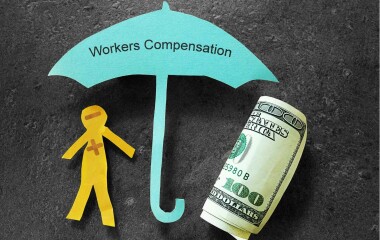If an employee suffers a work-related injury, they are entitled to compensation from the employer for the harm (damage) caused. In this article, we will discuss the various types of claims an employee can make and what to keep in mind.
The most common claims related to work injuries include:
- Compensation for loss of earnings during incapacity (wage compensation);
- Compensation for loss of earnings after incapacity (wage compensation);
- Compensation for pain;
- Compensation for the aggravation of social integration;
- Compensation for medical expenses;
- Material damage;
- Compensation for other non-material harm;
- Severance pay in case of a work-related injury.
The employer’s obligation to compensate the damage arises when a work-related injury occurs, and there is a causal connection between the injury and the resulting damage. In other words, if the work injury had not occurred, the damage would not have occurred either. This causal link must be proven with certainty. The employee does not have to report the injury, and the injury does not even need to be recorded in the accident log. However, the employee must prove that the injury occurred (e.g., by providing a witness’s testimony). We have outlined the correct procedures in previous posts (here and here).
1. Compensation for Loss of Earnings During Incapacity
An employee is entitled to compensation for loss of earnings during the period when, due to a work-related injury, they are temporarily unable to work. This compensation must be paid by the employer regularly on a monthly basis (unless otherwise agreed with the employee).
The compensation is calculated as the difference between the employee’s average earnings before the injury (which occurred due to the work-related accident) and the full amount of the wage or salary compensation.
However, not every work-related injury will result in a full work incapacity. For instance, if a clerk breaks their leg/arm (suffers a head injury or other type of trauma), they may still go to work and perform their original job. In such cases, the employee is not entitled to compensation, or it may be appropriately reduced (for example, the employee might work from home).
Partial exemption of the employers liability
If the employee refuses to perform work that they are capable of doing considering their medical condition (for instance, a head injury will likely prevent the employee from performing work altogether), the employer has the right to be fully or partially exempted from liability.
2. Compensation for Loss of Earnings After Incapacity
If an employee’s work-related injury results in a permanent reduction of their ability to earn an income, they are entitled to compensation for the loss of earnings even after the incapacity period has ended. This means that, due to the work injury, the employee earns less even after their incapacity ends.
If the employee is granted an invalidity pension due to the work injury, this pension is added to the employee’s earnings. This compensation is also available to an employee who, after the incapacity period, is not working but is registered as a job seeker.
The employer is obliged to pay this compensation regularly on a monthly basis, unless otherwise agreed with the employee. The compensation is due until the end of the calendar month in which the employee turns 65 or until the date the employee is granted an old-age pension under the pension insurance system.
3. Compensation for Pain and Aggravation of Social Integration
The Labour Code provides only brief guidelines for this compensation. Compensation for pain and for impaird social functioning is calculated according to a government decree. Pain and aggravation of social integration are evaluated in points according to the attachments of the government decree. The value of one point is 1% of the average wage as published by the Czech Statistical Office. The treating physician evaluates the injury in points in the medical report.
Compensation for Pain
Pain is understood as the physical and mental suffering caused by harm to health resulting from a work-related injury or occupational disease, including stress, difficulties, and psychological symptoms (including PTSD) usually associated with health damage, as well as treatment and recovery from the injury, including complications arising directly as a result of the work-related injury. Pain compensation is provided according to the point scale.
Aggravation of Social Integration
Aggravation of social integration refers to the permanent negative impact on an employee’s life caused by a work-related injury. As a result of the injury, permanent consequences and psychosocial impacts may occur, limiting the employee’s life, particularly in terms of their ability to meet personal, work, educational, and social needs. The point evaluation of social integration aggravation is typically conducted up to one year after the health damage occurred.
These are two separate rights to compensation for non-material damage. Both are paid as a lump sum. In exceptional cases, upon request by the plaintiff, the court may increase the compensation. Similarly, compensation may be increased if the employee’s original social life has been significantly worsened. If the employee dies, their survivors are entitled to compensation, provided that the compensation claim is filed while the employee is still alive.
4. Compensation for Necessary Medical Expenses
Compensation for necessary medical expenses is entitled to those who have incurred such expenses. This means that the compensation does not only need to be claimed by the employee but can also be claimed by family members who cared for the employee.
Only expenses that have already been incurred can be claimed—future expenses cannot be requested. The Labour Code does not define “necessary expenses,” but this generally refers to expenses related to treatment, rehabilitation, doctor visits, special diets (if prescribed by a doctor), or the hiring of a caregiver. You will find further information in the article about treatment costs.
5. Compensation for Material Damage
This provision supplements other types of compensation. This means that if an employee incurs damage as a result of a work-related injury that does not fall under other provisions, they are entitled to claim material damage compensation from the employer. This may include damage that occurred during the work injury itself or subsequent damage.
6. One-Time Compensation for Non-Material Harm in Cases of Severe Injury to Health
This compensation is for the family and close relatives of the injured employee. It is not intended for the employee directly but for their immediate family—spouse, partner, children, and parents. Other individuals in a family or similar relationship who experience the harm as their own may also apply. This may concern cases of harm to surviving family members.
While the law does not define what constitutes a severe injury to an employee’s health, it is assumed to refer to situations such as comatose states, serious brain damage, and other conditions with consequences close to death. The amount of compensation is not specified and will be determined by the court.
7. Severance Pay in Case of Work Injury
If an employee’s health is so affected that, according to the medical report, they can no longer perform their usual work, the employer may (and should) terminate the employment relationship by giving notice due to health reasons or enter into an agreement with the employee to end the employment for the same reason. If the employment relationship is terminated due to health reasons resulting from a work-related injury, the employee is entitled by law to severance pay. The severance pay amounts to 12 times the employee’s average monthly earnings.
Know Your Employee Rights
Most of these claims apply to the employee regardless of the cause of the work injury (whether it is due to a fall, burn, frostbite, chemical burns, electric shock, gunshot, traffic accident, fracture, or other type of work injury). These claims also apply to agency employees (work-related injury of an agency employee).
In this article, we have focused on the different types of compensation that an employee (or another entitled person) can claim from the employer for damage caused by a work-related injury. The employer first evaluates the claim, followed by the court. In the next article, we will focus on the employer's exemption from liability for damage caused by a work-related injury.
Do you need help obtaining compensation for work-related injuries? Contact us, and we will be happy to assist you. You can find the form here. For more information about our project, feel free to contact us and follow us on social media ((FB, IG, LI).
Contact Employee Rights
📞 By phone: +420 773 014 007
📧 : info@pravozamestnance.cz
🏢 Through the form
Social networks: Instagram, Facebook or LinkedIn
We protect and enforce employee rights. We strive to improve the working environment of employees in the Czech Republic. We are also your support when dealing with workplace accidents. For news, advice and tips on employee rights, we recommend our blog section, or following our social networks Instagram, Facebook or LinkedIn. Thank you.





